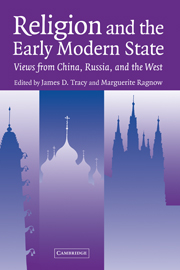Book contents
- Frontmatter
- Contents
- Contributors
- Acknowledgments
- Preface
- Religion and the Early Modern State
- Introduction
- PART I LIVED RELIGION AND OFFICIAL RELIGION
- PART II FORMS OF RELIGIOUS IDENTITY
- 5 Spirits of the Penumbra: Dieties Worshiped in More Than One Chinese Pantheon
- 6 Orthodoxy and Revolt: The Role of Religion in the Seventeenth-Century Ukrainian Uprising against the Polish-Lithuanian Commonwealth
- 7 The Huguenot Minority in Early Modern France
- 8 State Religion and Puritan Resistance in Early Seventeenth-Century England
- PART III THE SOCIAL ARTICULATION OF BELIEF
- AN EPILOGUE AT THE PARISH LEVEL
- Selected Annotated Bibliography of Secondary Works
- Index
8 - State Religion and Puritan Resistance in Early Seventeenth-Century England
Published online by Cambridge University Press: 23 May 2010
- Frontmatter
- Contents
- Contributors
- Acknowledgments
- Preface
- Religion and the Early Modern State
- Introduction
- PART I LIVED RELIGION AND OFFICIAL RELIGION
- PART II FORMS OF RELIGIOUS IDENTITY
- 5 Spirits of the Penumbra: Dieties Worshiped in More Than One Chinese Pantheon
- 6 Orthodoxy and Revolt: The Role of Religion in the Seventeenth-Century Ukrainian Uprising against the Polish-Lithuanian Commonwealth
- 7 The Huguenot Minority in Early Modern France
- 8 State Religion and Puritan Resistance in Early Seventeenth-Century England
- PART III THE SOCIAL ARTICULATION OF BELIEF
- AN EPILOGUE AT THE PARISH LEVEL
- Selected Annotated Bibliography of Secondary Works
- Index
Summary
Late in the 1640s, an anonymous author published an account of what he termed the eleventh persecution of the Church, particularly in London, by the “Puritan Faction (so long lying like the Canaanites, as thornes in the sides of our Israel)”:
And what havoc hath been made among the Sheep, since the City-Puritan Tumults cried out no Bishops, and armed fury hath forced thousands of the Clergy from their Flocks; the almost ruins of the Church and of three Kingdoms sufficiently witnesses; a just judgment of God upon a People long contending with their Priests and mocking, and misusing the Prophets and messengers of God, till like the Jews, the wrath of God fell upon them, … and all this vengeance executed by a generation of Vipers, styling themselves … the only people of God, the meek of the earth, Christ's little flock, weak Brethren.
Such a calamity was all the more remarkable in the view of the anonymous author because “all sorts of People account[ed] the Puritan faction, a simple inconsiderate party, well meaning people, tender conscienced Christians, such as deserved pity rather than punishment, little remembering our Saviour's caveat against wolves in sheep's clothing.”
Whether the “Puritan faction” were wolves in sheep's clothing or a generation of vipers depended largely on one's allegiances; it could be argued that, being the meek, they had indeed inherited the earth, or at least for a moment that corner called England.
- Type
- Chapter
- Information
- Religion and the Early Modern StateViews from China, Russia, and the West, pp. 207 - 250Publisher: Cambridge University PressPrint publication year: 2004
- 1
- Cited by



